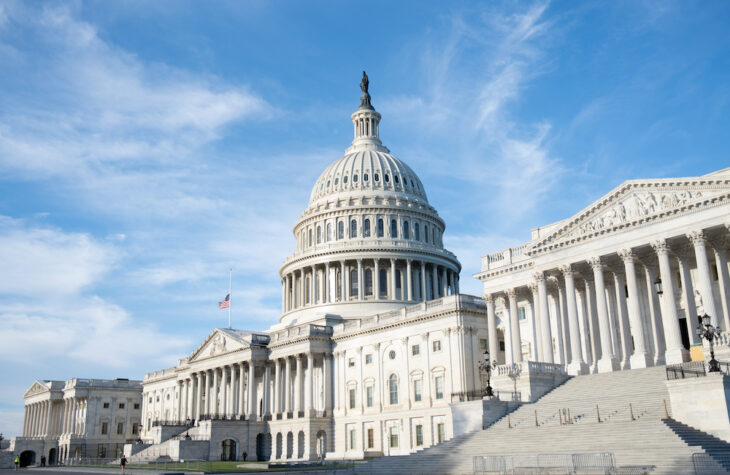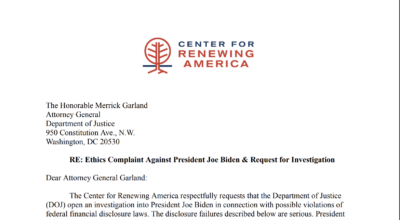
Primer: The Senate’s Proposed Gun Control Framework

Summary
A bipartisan group of 20 U.S. Senators–10 Democrats and 10 Republicans–released a proposed gun control framework on June 12, 2022, in the aftermath of the Buffalo and Uvalde killings. The horrific mass murders, carried out by two evil and mentally-ill teenagers, shocked the country. Unfortunately, the gun control obsession animating progressive activists and many elected officials stands in the way of solutions that will make communities safer in an increasingly unhealthy culture marred by broken households and institutions. The latest bipartisan Senate framework is no different.
Background: The Framework’s Reported Proposals
The details of the reported gun control framework suggest lawmakers intend to take up legislation that incorporates policies likely to infringe on key constitutional rights for law-abiding Americans. While the legislative text has yet to be released, reported provisions include:
- Federal grants designed to incentivize states to pass and implement unconstitutional “red flag” gun confiscation orders that could easily violate fundamental due process rights.
- Burdensome “pre-sale” regulatory requirements for federal firearm licensees (FFLs) which will likely hinder lawful business operations.
- So-called “clarifying” language to determine who qualifies as an FFL dealer, which could serve as a backdoor effort to implement universal background checks and an eventual national gun registry.
- Enhanced screening for adults between the ages of 18 and 20 who purchase firearms that require mandatory searches of juvenile justice and mental health records.
- Additional federal money for states to close the so-called “boyfriend loophole” pertaining to misdemeanor domestic abuse in dating relationships.
It remains to be seen what final form the purported measures will take, but the bipartisan coalition of 10 Democrat Senators and 10 Republican Senators suggests that the legislative filibuster may not be enough to thwart the latest congressional effort to punish law-abiding citizens for the actions of violent criminals.
Analysis: Punishing Law-Abiding Americans
The centerpiece of the proposed agreement attempts to utilize federal tax dollars to incentivize states to implement so-called “red flag” laws wherein judges are empowered to discard constitutional rights, including due process, and unilaterally determine whether law enforcement officials may seize an individual’s firearms. The proposal reframes “extreme risk protection orders” (ERPO) which are the mechanism for seizing firearms under a red flag law as “state crisis intervention orders.” The change in the lexicon is significant as the justification for confiscation orders could be greatly expanded under these new orders.
Radical ideologues on the left have promoted notions that “silence is violence” and characterized “misgendering” an individual as a hostile and potentially violent act. The slippery slope of playing fast and loose with language and ever-changing definitions among the activist class coupled with animosity toward fundamental constitutional rights is illustrative of the potent danger red flag laws pose to normal, law-abiding citizens.
There is no available data to suggest that red flag laws–which already exist in 20 states in various capacities–would have prevented a single recent mass shooting. In fact, the nation’s most stringent red flag law is found in New York state–the site of the recent Buffalo mass murder. Not a single provision within that law was triggered before the killer went on his horrific rampage. Despite various iterations of state red flag laws, none of the existing ones have proven to be effective in preventing the kind of mass murder recently witnessed in Buffalo and Uvalde. This is often due to the fact that such killers present no “red flags” prior to committing their atrocity (as occurred in Buffalo) or because authorities fail to act on prior behavior containing prosecutable arrests or involuntary commitment (as occurred in Uvalde).
Furthermore, the effort to “clarify” and then further regulate FFL dealers could pave the way for the implementation of a backdoor universal background check system, which would require the adoption of a national gun registry to enforce. While this ultimately depends on the final legislative language, definitional changes that potentially capture private transfers and comprehensive background checks mandated even for a subset of the population would likely necessitate some form of firearm registration check.
Currently, FFLs must check information from the firearm purchaser against the FBI’s National Instant Criminal Background Check System (NICS). They have a vested business interest to keep their licenses which requires them to perform background checks. Expanding those requirements to private citizen transfers would necessarily require a national registry in order for law enforcement to know whether or not the firearm holder went through a background check before acquiring that firearm. Such a system would violate existing federal law and put in place one of the final mechanisms necessary to enact a widescale gun confiscation effort.
The so-called “boyfriend loophole” has long been something that gun control activists have wanted to address. The “loophole” refers to the fact that while federal–and state laws–prohibit convicted domestic abusers who are married, living with their partners, or the parent of a child from purchasing or possessing firearms, there is no such provision for abusive “dating partners.” This particular provision was stripped out of the Senate’s version of the Violence Against Women Act reauthorization in February 2022 due to a lack of support.
The reality is that individuals convicted of domestic abuse are already prohibited from possessing firearms. The so-called “boyfriend loophole” expands potentially confiscatory efforts to incorporate myriad misdemeanor convictions as well as restraining orders in non-married relationships arrayed under the guise of domestic abuse. Such a policy could permanently strip an individual of his or her constitutional rights for a misdemeanor charge in a fleeting or temporary dating relationship.
Lastly, and perhaps most concerning, is the lack of grounded specificity in the proposed framework’s measures. Lawmakers routinely pass legislation light on details and outsource the statutory implications to federal agencies and the administrative state through the regulatory process. Therefore, vagueness is likely a feature, rather than a bug, in order to give maximum discretion to federal bureaucrats in the Bureau of Alcohol, Tobacco, Firearms, and Explosives (ATF) as they interpret and implement the new laws. It is therefore critical that citizens and policymakers approach the proposed framework from a position of extreme skepticism.
A Recipe For Continued Civic Erosion
Aside from the concerning policy implications, which are likely to increase following the release of legislative text, the framework could easily further fracture the contours of civil society. This is because the proposal contains three specific and fundamental flaws in its underlying rationale:
- Punishes Good Citizens: The framework as outlined creates impositions on law-abiding, model citizens by undermining their God-given, constitutionally-affirmed rights to due process and self-defense. This will further erode civic comity and deepen distrust in America’s rapidly-waning institutions. Federal gun laws already prohibit violent criminals from possessing or purchasing a weapon.
- Weaponizes Government: The framework as outlined gives far-left radicals in deep blue states the power and ability to target their political opponents through red flag laws. As an example, Rep. Eric Swalwell (D-CA) recently tweeted that a red flag law should be used against Ben Shapiro, an influential conservative thinker. Given the left’s belief that speech can be equivalent to violence, there is no reason to believe California or New York won’t utilize red flag laws to persecute political conservatives.
- Balkanizes Communities: The framework as outlined incentivizes conservatives to flee to red states or red communities and progressives to do the same in blue states or blue communities. This deepening balkanization will not only deteriorate trust between citizens, but will amplify tensions among neighbors and in communities.
In an official statement released by the senators supporting the proposed gun control framework, lawmakers stated that, “Families are scared, and it is our duty to come together and get something done that will help restore their sense of safety and security in their communities.”
Good decisions are rarely made out of fear. This is especially true when such decisions threaten the rights of lawful citizens and punish them because of the actions of individual criminals. At a time when violent crime is soaring to historic highs across the country–both in cities and rural communities–the proposed gun control framework threatens the ability of Americans to defend themselves and their families.
A more thoughtful, effective, and constitutional approach to improve the safety and security of our communities is both possible and necessary. Lawmakers should focus on hardening schools, expanding mental health institutions, committing mentally ill individuals to institutions to receive the therapy they need, arresting violent criminals when they make prosecutable threats, and focusing on restoring broken families through policies that reward and emphasize fatherhood.
Concluding Assessment
The framework outlined by Senate negotiators is yet another reminder that far too many legislators view traumatic events as an opportunity to seize additional power and control over model citizens who dare to exercise their God-given rights. The core provisions in the proposed framework are unlikely to have any meaningful impact on reducing violent crimes committed with guns. However, they are guaranteed to threaten the rights and interests of patriotic, working-class Americans who remain besieged by the unrelenting advance of harmful progressive policies and anti-constitutional institutions.



